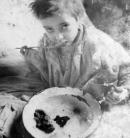אונטער די חורבֿות פֿון פּוילן
אַ קאָפּ מיט בלאָנדע האָר
דער קאָפּ און סייַ דער חורבן
ביידע זייַנען וואָר.
דאָליע מייַנע דאָליע,
דאָליע דאָליע מייַנע...
איבער די חורבֿות פֿון פּוילן
פֿאַלט און פֿאַלט דער שניי,
דער בלאָנדער קאָפּ פֿון מייַן מיידל
טוט מיר מסוכּן וויי.
דער ווייטיק זיצט בייַם שרייַבטיש
און שרייַבט אַ לאַנגן בריוו
די טרער אין זייַנע אויגן
איז אמתדיק און טיף.
דאָליע מייַנע דאָליע,
דאָליע מייַנע דאָליע...
איבער די חורבֿות פֿון פּוילן
פֿלאַטערט אַ פֿויגל אום,
אַ גרויסער שיבֿעה פֿויגל
ער ציטערט מיט די פֿליגל פֿרום.
דער גרויסער שיבֿעה פֿויגל
(מייַן דערשלאָגן געמיט )
ער טראָגט אויף זייַנע פֿליגל
דאָס דאָזיקע טרויער ליד.
דאָליע מייַנע דאָליע,
דאָליע מייַנע דאָליע...
אַ קאָפּ מיט בלאָנדע האָר
דער קאָפּ און סייַ דער חורבן
ביידע זייַנען וואָר.
דאָליע מייַנע דאָליע,
דאָליע דאָליע מייַנע...
איבער די חורבֿות פֿון פּוילן
פֿאַלט און פֿאַלט דער שניי,
דער בלאָנדער קאָפּ פֿון מייַן מיידל
טוט מיר מסוכּן וויי.
דער ווייטיק זיצט בייַם שרייַבטיש
און שרייַבט אַ לאַנגן בריוו
די טרער אין זייַנע אויגן
איז אמתדיק און טיף.
דאָליע מייַנע דאָליע,
דאָליע מייַנע דאָליע...
איבער די חורבֿות פֿון פּוילן
פֿלאַטערט אַ פֿויגל אום,
אַ גרויסער שיבֿעה פֿויגל
ער ציטערט מיט די פֿליגל פֿרום.
דער גרויסער שיבֿעה פֿויגל
(מייַן דערשלאָגן געמיט )
ער טראָגט אויף זייַנע פֿליגל
דאָס דאָזיקע טרויער ליד.
דאָליע מייַנע דאָליע,
דאָליע מייַנע דאָליע...
Contributed by Bartleby + CCG/AWS Staff - 2011/2/1 - 08:33
Language: Yiddish
La trascrizione in caratteri latini.


1939. Convoglio militare tedesco. La scritta recita: ”Stiamo andando in polonia a colpire gli ebrei”
UNTER DI KHURVES FUN POYLN (DOLYE)
Unter di khurves fun Poyln
A kop mit blonde hor
Der kop un say der khurbn
Beyde zaynen vor.
Dolye, mayne dolye,
Dolye, mayne dolye...
Iber di khurves fun Poyln
Falt un falt der shney,
Der blonder kop fun mayn meydl
Tut mir mesukn vey.
Der veytik zitst baym shraybtish
Un shraybt a langn briv
Di trer in zayne oygn
Iz emesdik un tif.
Dolye, mayne dolye,
Dolye, mayne dolye...
Iber di khurves fun Poyln
Flatert a foygl um,
A groyser shive foygl
Er tsitert mit di fligl frum.
Der groyser shive foygl
(Mayn dershlogn gemit)
Er trogt oyf zayne fligl
Dos dozike troyer lid.
Dolye, mayne dolye,
Dolye, mayne dolye...
Unter di khurves fun Poyln
A kop mit blonde hor
Der kop un say der khurbn
Beyde zaynen vor.
Dolye, mayne dolye,
Dolye, mayne dolye...
Iber di khurves fun Poyln
Falt un falt der shney,
Der blonder kop fun mayn meydl
Tut mir mesukn vey.
Der veytik zitst baym shraybtish
Un shraybt a langn briv
Di trer in zayne oygn
Iz emesdik un tif.
Dolye, mayne dolye,
Dolye, mayne dolye...
Iber di khurves fun Poyln
Flatert a foygl um,
A groyser shive foygl
Er tsitert mit di fligl frum.
Der groyser shive foygl
(Mayn dershlogn gemit)
Er trogt oyf zayne fligl
Dos dozike troyer lid.
Dolye, mayne dolye,
Dolye, mayne dolye...
Contributed by Bartleby + RV - 2013/5/27 - 12:56
Language: Italian
Traduzione italiana di Riccardo Venturi
27 maggio 2013
27 maggio 2013
Eseguita direttamente sul testo originale yiddish. Si vedano anche le Note alla traduzione.
FATO
Sotto le rovine della Polonia
c'è una testa dai capelli biondi;
la testa, e pure le rovine 1,
sono tutte e due vere.
Sulle rovine della Polonia
cade, cade la neve,
la bionda testa della mia ragazza
mi dà una pena tremenda.
Fato, è il mio fato.
Fato, è il mio fato. 2
Il dolore siede alla scrivania
e scrive una lunga lettera.
Le lacrime nei suoi occhi
sono autentiche e profonde.
Sulle rovine della Polonia
sta volando un uccello,
un grosso uccello di lutto 3
agita pietosamente le ali.
Fato, è il mio fato.
Fato, è il mio fato.
Il grosso uccello di lutto
(che è il mio animo triste)
porta con le sue ali
questa canzone di lutto.
Fato, è il mio fato.
Fato, è il mio fato.
Sotto le rovine della Polonia
c'è una testa dai capelli biondi;
la testa, e pure le rovine 1,
sono tutte e due vere.
Sulle rovine della Polonia
cade, cade la neve,
la bionda testa della mia ragazza
mi dà una pena tremenda.
Fato, è il mio fato.
Fato, è il mio fato. 2
Il dolore siede alla scrivania
e scrive una lunga lettera.
Le lacrime nei suoi occhi
sono autentiche e profonde.
Sulle rovine della Polonia
sta volando un uccello,
un grosso uccello di lutto 3
agita pietosamente le ali.
Fato, è il mio fato.
Fato, è il mio fato.
Il grosso uccello di lutto
(che è il mio animo triste)
porta con le sue ali
questa canzone di lutto.
Fato, è il mio fato.
Fato, è il mio fato.
NOTE alla traduzione
[1] Il termine חורבן, di derivazione ebraica, nella pronuncia ashkenazita può leggersi indifferentemente [khurbn] o [khurbm]. Si deve tenere presente che, oltre al significato proprio di “rovina” (e “rovine” fisiche), indica comunemente l'Olocausto; in pratica è il termine yiddish per “shoah”.
[2] Il termine דאָליע [dolye] appartiene al lessico yiddish di derivazione slava.
[3] Il primo elemento del composto è l'ebraico שבֿעה “lutto” così come letto nella pronuncia ashkenazita, [shive]. Propriamente, la shive era il periodo di lutto di sette giorni osservato dalla famiglia e dagli amici della persona deceduta; sembra che il poeta, affidando la shive ad un uccello, voglia estendere il lutto, nella maniera debita e prescritta dalla tradizione, a tutta la Polonia ebraica martoriata.
[1] Il termine חורבן, di derivazione ebraica, nella pronuncia ashkenazita può leggersi indifferentemente [khurbn] o [khurbm]. Si deve tenere presente che, oltre al significato proprio di “rovina” (e “rovine” fisiche), indica comunemente l'Olocausto; in pratica è il termine yiddish per “shoah”.
[2] Il termine דאָליע [dolye] appartiene al lessico yiddish di derivazione slava.
[3] Il primo elemento del composto è l'ebraico שבֿעה “lutto” così come letto nella pronuncia ashkenazita, [shive]. Propriamente, la shive era il periodo di lutto di sette giorni osservato dalla famiglia e dagli amici della persona deceduta; sembra che il poeta, affidando la shive ad un uccello, voglia estendere il lutto, nella maniera debita e prescritta dalla tradizione, a tutta la Polonia ebraica martoriata.
Language: English
Versione inglese tratta da “Life in the Ghetto - The Personal Story of Gizella Abramson”
FATE
Under the ruins of Poland
Lies a head with blond hair.
Both the head and the ruins
Are true.
Over the ruins of Poland
The snow keeps falling and falling,
The blond head of my girl
Gives me great pain.
Fate my fate,
Fate, my fate.
Pain is sitting at the desk
Writing a long letter.
The tear in his eyes
Is deep and true.
Over the ruins of Poland
A bird flutters about.
A great bird of mourning
Flutters his wings piously.
Fate my fate,
Fate, my fate.
The great bird of mourning
(My sad spirit),
Bears this song of mourning
On his wings.
Fate my fate,
Fate, my fate.
Under the ruins of Poland
Lies a head with blond hair.
Both the head and the ruins
Are true.
Over the ruins of Poland
The snow keeps falling and falling,
The blond head of my girl
Gives me great pain.
Fate my fate,
Fate, my fate.
Pain is sitting at the desk
Writing a long letter.
The tear in his eyes
Is deep and true.
Over the ruins of Poland
A bird flutters about.
A great bird of mourning
Flutters his wings piously.
Fate my fate,
Fate, my fate.
The great bird of mourning
(My sad spirit),
Bears this song of mourning
On his wings.
Fate my fate,
Fate, my fate.
Contributed by Bartleby - 2011/2/1 - 08:34
Language: English
Versione inglese di Daniel Kahn & The Painted Bird, dall'album "The Broken Tongue" del 2006.
UNDER THE RUINS OF POLAND
Under the ruins of Poland, a head with golden hair.
The head & also my city, both lie in ruin there.
Over the ruins of Poland the sky fills the houses with snow
The golden head of my maiden fills my head with woe.
The woe leans over the table & writes a long letter to her
The tears falling over the paper
Are real as the words are blurred.
Over the ruins of Poland, up in the skies of white,
A great black raven of mourning silently winging in flight
The great, black raven of mourning,
(How my heart lives in this bird!)
He bears on his wing while flying this lowly mournful dirge.
Under the ruins of Poland, a head with golden hair.
The head & also my city, both lie in ruin there.
Over the ruins of Poland the sky fills the houses with snow
The golden head of my maiden fills my head with woe.
The woe leans over the table & writes a long letter to her
The tears falling over the paper
Are real as the words are blurred.
Over the ruins of Poland, up in the skies of white,
A great black raven of mourning silently winging in flight
The great, black raven of mourning,
(How my heart lives in this bird!)
He bears on his wing while flying this lowly mournful dirge.
Contributed by Bartleby - 2011/3/9 - 15:20
×
![]()
Note for non-Italian users: Sorry, though the interface of this website is translated into English, most commentaries and biographies are in Italian and/or in other languages like French, German, Spanish, Russian etc.






Poesia di Yitsik Manger (1938)
Musica di Shaul Berezovsky (1908-1975)
A poem by Yitsik Manger (1938)
Music by Shaul Berezovsky (1908-1975)
Poesia di Yitsik Manger (1901-1969), uno dei maggiori poeti e scrittori in lingua yiddish, nato in Bucovina ma polacco d’elezione. Nel 1938 l’antisemitismo dilagante in Polonia lo costrinse a fuggire da Varsavia, giusto in tempo per non finire nelle mani dei nazisti che avrebbero invaso il paese qualche mese più tardi.
Peregrinò tra Francia, Tunisia ed Inghilterra per stabilirsi infine in Israele, dove morì nel 1969.
Il testo yiddish (in trascrizione) e la traduzione inglese sono stati trovati su “Life in the Ghetto - The Personal Story of Gizella Abramson”. La ritrascrizione in caratteri ebraici era stata preparata appositamente per questo sito, ma è stata poi sostituita con il testo originale in caratteri ebraici fornito da Yidlid (2.4.2017) [RV]